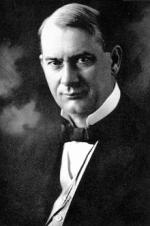Disable ads!
Joseph Franklin Rutherford
Part of a series on Jehovah's Witnesses Overview Organizational structure Governing Body Watch Tower Bible and Tract Society Corporations History Bible Student movement Leadership dispute Splinter groups Doctrinal development Unfulfilled predictions Demographics By country Beliefs Practices Salvation Eschatology The 144,000 Faithful and discreet slave Hymns God's name Blood Discipline Literature The Watchtower Awake! New World Translation List of publications Bibliography Teaching programs Kingdom Hall Gilead School People Watch Tower presidents W. H. Conley C. T. Russell J. F. Rutherford N. H. Knorr F. W. Franz M. G. Henschel D. A. Adams Formative influences William Miller Henry Grew George Storrs N. H. Barbour John Nelson Darby Notable former members Raymond Franz Olin Moyle Opposition Criticism Persecution Supreme Court cases by country v t e Joseph Franklin Rutherford (November 8, 1869 – January 8, 1942), also known as "Judge" Rutherford, was the second president of the incorporated Watch Tower Bible and Tract Society of Pennsylvania. He played a primary role in the organization and doctrinal development of Jehovah's Witnesses, which emerged from the Bible Student movement established by Charles Taze Russell. Rutherford began a career in law, working as a court stenographer, trial lawyer and prosecutor. He became a special judge in the 14th Judicial District of Missouri at some time after 1895. He developed an interest in the doctrines of Watch Tower Society president Charles Taze Russell, which led to his joining the Bible Student movement and was baptized in 1906. He was appointed the legal counsel for the Watch Tower Society in 1907, as well as a traveling representative prior to his election as president in 1917. His early presidency was marked by a dispute with the Society's board of directors, in which four of its seven members accused him of autocratic behavior and sought to reduce his powers. The resulting leadership crisis divided the Bible Student community and contributed to the loss of one-seventh of adherents by 1919 and thousands more by 1931. Rutherford and seven other Watch Tower executives were imprisoned in 1918 after charges were laid over the publication of The Finished Mystery, a book deemed seditious for its opposition to World War I. Rutherford introduced many organizational and doctrinal changes that helped shape the current beliefs and practices of Jehovah's Witnesses. He imposed a centralized administrative structure on the worldwide Bible Student movement, which he later called a theocracy, requiring all adherents to distribute literature via door to door preaching and to provide regular reports of their activity. He also instituted training programs for public speaking as part of their weekly meetings for worship. He established 1914 as the date of Christ's invisible return, asserted that Christ died on a tree rather than a cross, formulated the current Witness concept of Armageddon as God's war on the wicked, and reinforced the belief that the start of Christ's millennial reign was imminent. He condemned the observance of traditional celebrations such as Christmas and birthdays, the saluting of national flags and the singing of national anthems. He introduced the name "Jehovah's witnesses" in 1931 and the term "Kingdom Hall" for houses of worship in 1935. He wrote twenty-one books and was credited by the Society in 1942 with the distribution of almost 400 million books and booklets. Despite significant decreases during the 1920s, overall membership increased more than sixfold by the end of Rutherford's 25 years as president.
 Read more on wikipedia.org Read more on wikipedia.org
 All quotes by Joseph Franklin Rutherford All quotes by Joseph Franklin Rutherford
 Edit Edit
|

|
|
|
|
|
Background photo by Giuliana
|